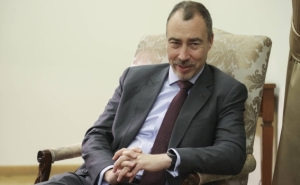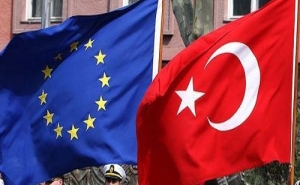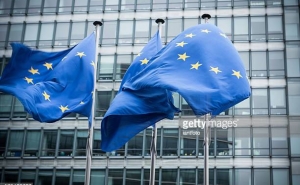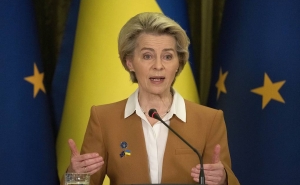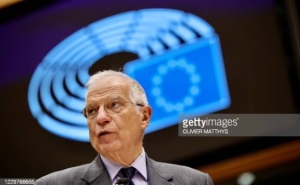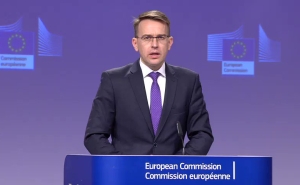Luis R. Corteguera: Declaration of Independence by Catalonia Might Move Madrid to Apply Article 155 of the Spanish Constitution (EXCLUSIVE)

"Armedia" IAA presents an exclusive interview with Luis R. Corteguera, professor, associate chair at the Department of History in the University of Kansas (the main field of research is the early modern Spain) on the results of Catalan independence referendum and the possible developments.
- In quite difficult conditions, Catalonia was able to hold an independence referendum. How would you assess the process? Can it be considered a legitimate one?
- The voting that took place in Catalonia last Sunday was a political victory for advocates of independence and a serious defeat to the central government, which had vowed a vote would not happen. The large turnout that defied court orders declaring the referendum illegal and the extraordinary police deployment to stop the vote belies the Spanish government’s assertion that a referendum did not take place. Yet questions remain about the referendum results, given the chaotic situation in many polling stations and the fact that police prevented some people from voting and confiscated ballots. Moreover, the board charged with certifying the results of the vote resigned days before the referendum to avoid fines imposed by the courts. The legitimacy of the results is therefore unclear. The fact that less than fifty per cent of voters participated also undermines that legitimacy.
- How would you comment the actions of the official Madrid during this process?
- The central government in Madrid insists it achieved its goal of preventing the referendum from taking place in an orderly and smooth fashion. However, there is a widespread sense that the situation has gotten out of its control. Efforts to stop the vote by relying on the courts to declare the referendum illegal, by taking control of Catalan finances to prevent expenditures on the referendum, and finally, by deploying thousands of police to thwart the vote, has had the opposite effect of emboldening the Catalan government and supporters of independence. Spanish Prime Minister Mariano Rajoy maintains his government will continue to follow the proper course of action to defend the Spanish constitution, but this strategy not only failed to stop thousands of people in the streets from supporting the defiant Catalan authorities, it led to the ineffectual use of police force that has eroded international support for the central government.
- What developments to expect? Will the sides sit down for a dialogue?
- Catalan authorities continue to call for international mediation, preferably from the European Union, which has refused to intervene in what it calls an internal Spanish matter. Catalan President Puigdemont announced Sunday night he will soon present the results of the referendum to the Parliament of Catalonia, which last month approved a law stipulating a unilateral declaration of independence if the results of the vote favored independence. Authorities in Madrid have not announced what course of action they will take, but a declaration of independence might move it to apply article 155 of the Spanish constitution, which allows the Spanish government to establish direct rule over an autonomous government for extraordinary reasons. This would constitute an extreme measure, never taken in forty years of democratic rule. Other proposals for Spanish mediation have thus far gained little traction. And so, the future remains uncertain.
Other materials on this subject
- The European Union Has Decided to Abandon Russian Coal In the Summer Many countries have joined these sanctions, even if this necessarily implies economic costs for ourselves," he noted.
- Germany Faces Steep Recession if Russian Oil and Gas Halted, Bank Lobby Says "The situation would be even worse if imports or supplies of Russian oil and natural gas were to be halted. A significant recession in Germany would then be virtually unavoidable," Sewing told journalists.
- EU Leaders Agree on Joint Gas Purchases Last year, the European Commission proposed to the EU countries a system of joint purchases of strategic gas reserves as a way to provide a buffer against possible supply disruptions. Fears of supply disruptions...
- European Union Launches “Team Europe” Package to Support Partner Countries with More than €20 Billion: Reuters Most of the money is being reallocated from other, less urgent EU foreign aid schemes in the EU’s common budget, but Borrell said the European Investment Bank, the European Bank for Reconstruction and...
- The Guardian: EU Leaders Clash Over Economic Response to Coronavirus Crisis Meeting via a video link, the EU’s 27 leaders papered over deep divisions by agreeing that another fortnight was needed to discuss ambitious economic recovery plans. After a testy debate over "coronabonds",...
-
 17:08
17:08The regular session of the Anti-corruption Policy Council takes place in Jermuk
-
 15:05
15:05The Prime Minister sends congratulatory messages to the supreme leader of Iran and the President of Iran
-
 11:11
11:11Armenia sends earthquake aid to Turkey
-
 10:43
10:43Commemoration of the Pontiff St. Sahak Partev
-
 09:16
09:16Some roads are closed and difficult to pass in Armenia
-
 19:55
19:55Phone conversation of the Foreign Minister of Armenia with the U.S. Assistant Secretary of State for European and Eurasian Affairs
-
 18:30
18:30Prime Minister Pashinyan and President Khachaturyan meet
-
 18:20
18:20Ararat Mirzoyan with Co-Chairman of the OSCE Minsk Group of France Brice Roquefeuil
-
 17:01
17:01Humans could land on Mars within 10 years, Musk predicts
-
 16:45
16:45France, US urge 'immediate' end to Nagorno Karabakh blockade
-
 16:01
16:01Blockaded Nagorno Karabakh launches fundraiser to support quake-hit Syria
-
 15:59
15:59Earthquake death toll in Turkey rises to 18,342
-
 15:43
15:43Ararat Mirzoyan Held a Telephone Conversation with Sergey Lavrov
-
 15:06
15:06French president rules out fighter jet supplies to Ukraine in near future
-
 14:47
14:475 Day Weather Forecast in Armenia
-
 14:44
14:44President Vahagn Khachaturyan wrote a note in the book of condolences opened in the Embassy of Syria in Armenia
-
 14:20
14:20Azerbaijan’s provocations impede establishment of peace and stability – Armenian FM tells Russian Co-Chair of OSCE MG
-
 12:57
12:57France representation to OSCE: Paris calls on Azerbaijan to restore freedom of movement through Lachin corridor
-
 11:40
11:40Command of Kosovo forces highly appreciated preparation of Armenian peacekeepers
-
 10:16
10:16The United States withdrew from sanctions against Syria for six months the provision of assistance after the earthquake
day
week
month
Humidity: %
Wind: km/h



